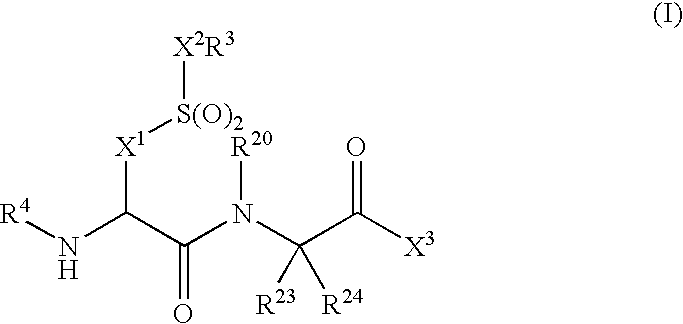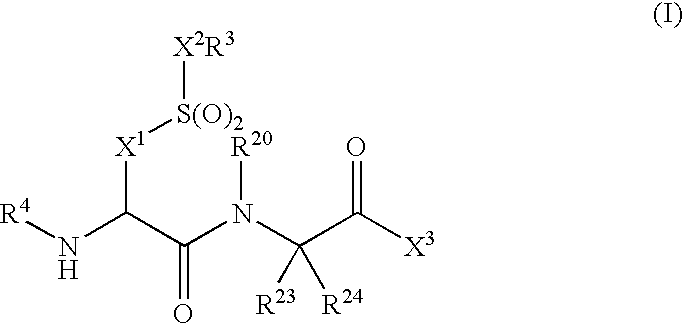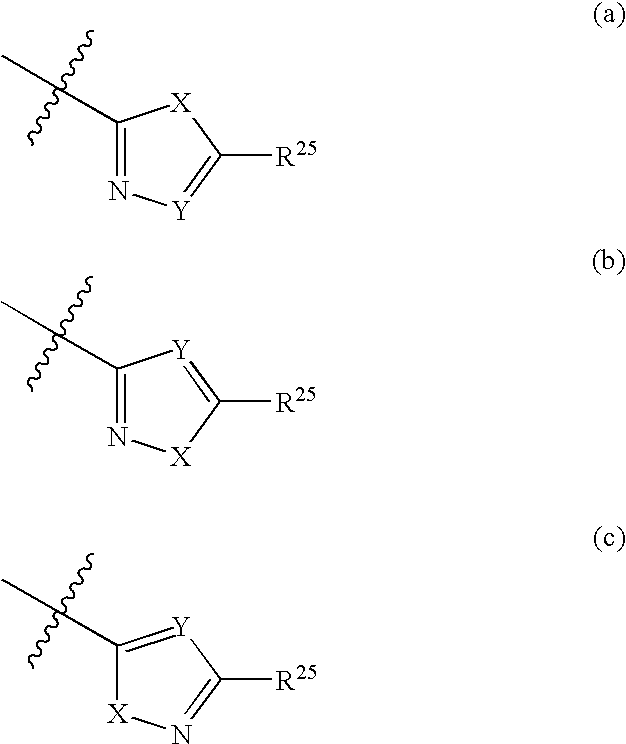Compounds and compositions as cathepsin S inhibitors
a technology of cathepsin and compound, applied in the field of peptidases, can solve the problems of pathological consequences and the inability to fully inhibit the activity of cysteine proteases, and achieve the effect of preventing, inhibiting or ameliorating the pathology and/or symptomatology of the diseas
- Summary
- Abstract
- Description
- Claims
- Application Information
AI Technical Summary
Benefits of technology
Problems solved by technology
Method used
Image
Examples
example 1
Morpholine-4-carboxylic acid {2-phenylmethanesulfonyl-1-[1-(5-phenyl-[1,3,4]oxadiazole-2-carbonyl)-pentylcarbamoyl]-ethyl}-amide
[0270]
[0271]To a stirred mixture of 2-[(morpholine-4-carbonyl)-amino]-3-phenylmethane-sulfonyl-propionic acid (135 mg, 0.37 mmol), 2-amino-1-(5-phenyl-[1,3,4]oxadiazol-2-yl)-1-hexanol TFA salt (135 mg, 0.36 mmol), prepared as in Reference 1, and HOBt (66 mg, 0.43 mmol) in MeCl2 (5 ml), was added EDC (103.6 mg, 0.54 mmol) and N-methylmorpholine (0.4 ml) at room temperature. After stirring for 14 hours, the reaction mixture was extracted with ethyl acetate. The organic layer was washed with saturated NaHCO3, brine, dried with MgSO4 and concentrated. The residue was subjected to silica gel column chromatography to yield morpholine-4-carboxylic acid (1-{1-[hydroxy-(5-phenyl-[1,3,4]oxadiazol-2-yl)-methyl]-pentylcarbamoyl}-2-phenylmethane-sulfonyl-ethyl)-amide (150 mg); MS: 598.6 (M−1), 600.6 (M+1).
[0272]Morpholine-4-carboxylic acid (1-{1-[hydroxy-(5-phenyl-[1,3,...
example 2
Morpholine-4-carboxylic acid {2-(2-difluoromethoxy-phenylmethanesulfonyl)-1-[1-(5-pyridin-3-yl-[1,3,4]oxadiazole-2-carbonyl)-pentylcarbamoyl]-ethyl}-amide
[0273]
[0274]To a stirred mixture of 2-[(morpholine-4-carbonyl)-amino]-3-o-difluoromethoxyphenylmethane-sulfonyl-propionic acid (105.5 mg, 0.25 mmol), 2-amino-1-(5-pyridin-3-yl-[1,3,4]oxadiazol-2-yl)-hexan-1-ol TFA salt (101.6 mg, 0.27 mmol), prepared as in Reference 2, and HOBt (46 mg, 0.3 mmol) in MeCl2 (5 ml), was added EDC (73 mg, 0.38 mmol) and N-methylmorpholine (0.2 ml) at room temperature. After stirring for 14 hours, the reaction mixture was extracted with ethyl acetate. The organic layer was washed with saturated NaHCO3, brine, dried with MgSO4 and concentrated. The residue was subjected to silica gel column chromatography to yield morpholine-4-carboxylic acid (1-{1-[hydroxy-(5-(3-pyridyl)-[1,3,4]oxadiazol-2-yl)-methyl]-pentylcarbamoyl}-2-o-difluoromethoxyphenylmethane-sulfonyl-ethyl)-amide (56 mg); MS: 665.4 (M−1), 667.0 ...
example 3
Morpholine-4-carboxylic acid {2-o-difluoromethoxyphenylmethanesulfonyl-1-[1-(5-(4-pydridyl)-[1,3,4]oxadiazole-2-carbonyl)-pentylcarbamoyl]-ethyl}-amide
[0276]
[0277]To a stirred mixture of 2-[(morpholine-4-carbonyl)-amino]-3-o-difluoromethoxyphenylmethane-sulfonyl-propionic acid (278 mg, 0.66 mmol), 2-amino-1-(5-(4-pyridyl)-[1,3,4]oxadiazol-2-yl)-1-hexanole TFA salt (248 mg, 0.66 mmol), prepared as above, and HOBt (121 mg, 0.79 mmol) in MeCl2 (5 ml), was added EDC (190 mg, 0.99 mmol) and N-methylmorpholine (0.4 ml) at room temperature. After stirring for 14 hours, the reaction mixture was extracted with ethyl acetate. The organic layer was washed with saturated NaHCO3, brine, dried with MgSO4 and concentrated. The residue was subjected to silica gel column chromatography to yield morpholine-4-carboxylic acid (1-{1-[hydroxy-(5-(4-pyridyl)-[1,3,4]oxadiazol-2-yl)-methyl]-pentylcarbamoyl}-2-o-difluoro-methoxyphenylmethane-sulfonyl-ethyl)-amide (430 mg); MS: 665.4 (M−1), 667.2 (M+1). Morph...
PUM
 Login to View More
Login to View More Abstract
Description
Claims
Application Information
 Login to View More
Login to View More - R&D
- Intellectual Property
- Life Sciences
- Materials
- Tech Scout
- Unparalleled Data Quality
- Higher Quality Content
- 60% Fewer Hallucinations
Browse by: Latest US Patents, China's latest patents, Technical Efficacy Thesaurus, Application Domain, Technology Topic, Popular Technical Reports.
© 2025 PatSnap. All rights reserved.Legal|Privacy policy|Modern Slavery Act Transparency Statement|Sitemap|About US| Contact US: help@patsnap.com



